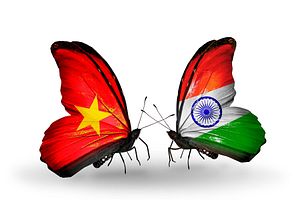Ahead of Xi Jinping’s scheduled three-day visit to India, Indian President Pranab Mukherjee traveled to Vietnam for a state visit. At the conclusion of his trip to Vietnam, Mukherjee and his counterpart, Truong Tan Sang, issued a joint communique in which they jointly called for countries to stand for freedom of navigation in the disputed South China Sea. The communique is ostensibly aimed at China, which was engaged in a major stand-off earlier this year with Vietnam after it placed an oil rig within waters Vietnam claims as its exclusive economic zone (EEZ) as defined by the United Nations Convention on the Law of the Sea (UNCLOS).
More specifically, the communique calls for South China Sea countries to codify and implement the 2002 Declaration on the Conduct of Parties in the South China Sea and work towards adopting a “Code of Conduct.” The idea of a code of conduct in the South China Sea has met considerable resistance from China, which instead prefers to handle disputes in the region on a bilateral basis. Apart from China, major disagreements exist within ASEAN regarding the need for a code of conduct. Such disagreements led to the disintegration of the 2012 ASEAN summit in which regional leaders were unable to agree to a joint statement. As per India and Vietnam’s joint communique:
The leaders reiterated their desire and determination to work together to maintain peace, stability, growth and prosperity in Asia. They agreed that freedom of navigation in the East Sea/South China Sea should not be impeded and called the parties concerned to exercise restraint, avoid threat or use of force and resolve disputes through peaceful means in accordance with universally recognized principles of international law, including the UNCLOS-1982. They also welcomed the collective commitment of the concerned parties to abide by and implement the 2002 Declaration on the Conduct of Parties in the South China Sea and to work towards the adoption of a Code of Conduct in the South China Sea on the basis of consensus. They called for cooperation in ensuring security of sea-lanes, maritime security, combating piracy and conducting search and rescue operations.
Mukherjee’s trip to Vietnam resulted in other agreements as well. Overall, India and Vietnam signed seven agreements over the course of the visit. As The Hindu reports, one of these agreements will see greater cooperation between the two countries in the oil sector. Vietnam has granted India oil exploration rights within its EEZ in the past and will likely continue to do so. Additionally, India will extend a credit line to Vietnam per an agreement signed during Mukherjee’s visit. The two countries also signed a memorandum of understanding (MOU) on agricultural cooperation, and a MOU on “operating and jointly promoting direct air services between Vietnam Airlines (Vietnam) and Jet Airways (India).”

































